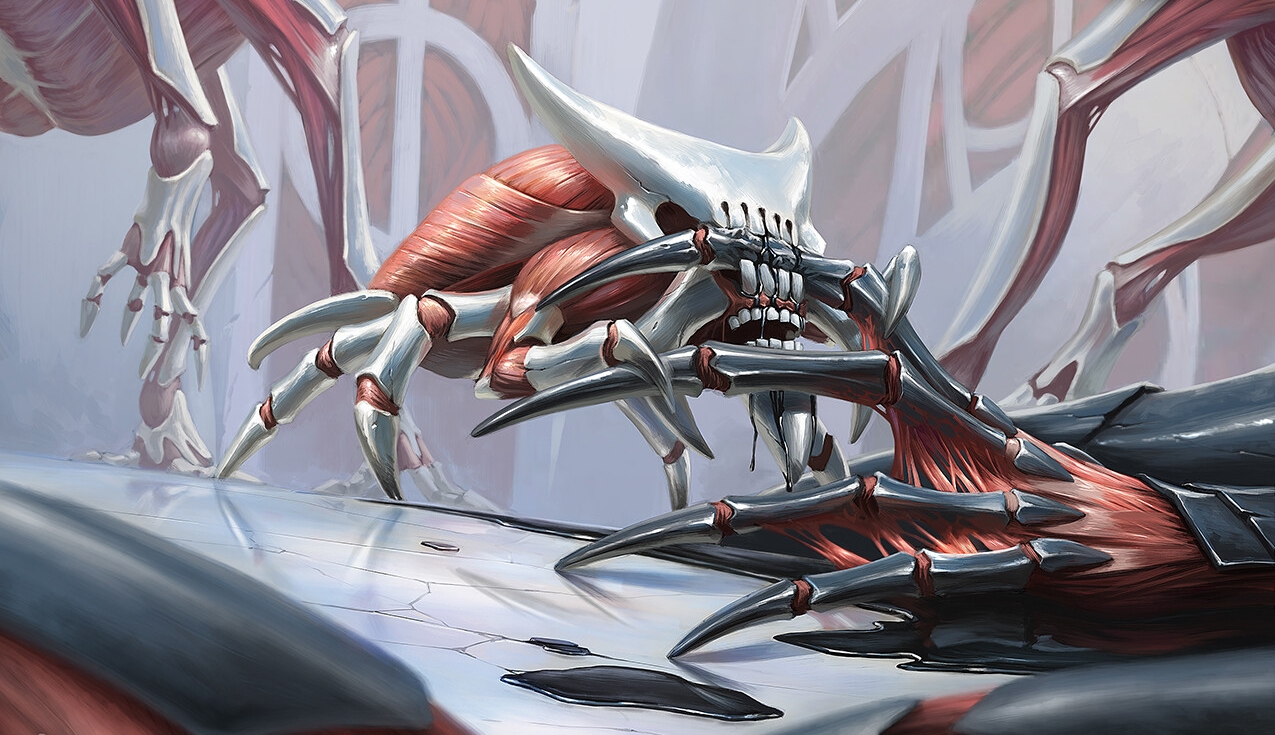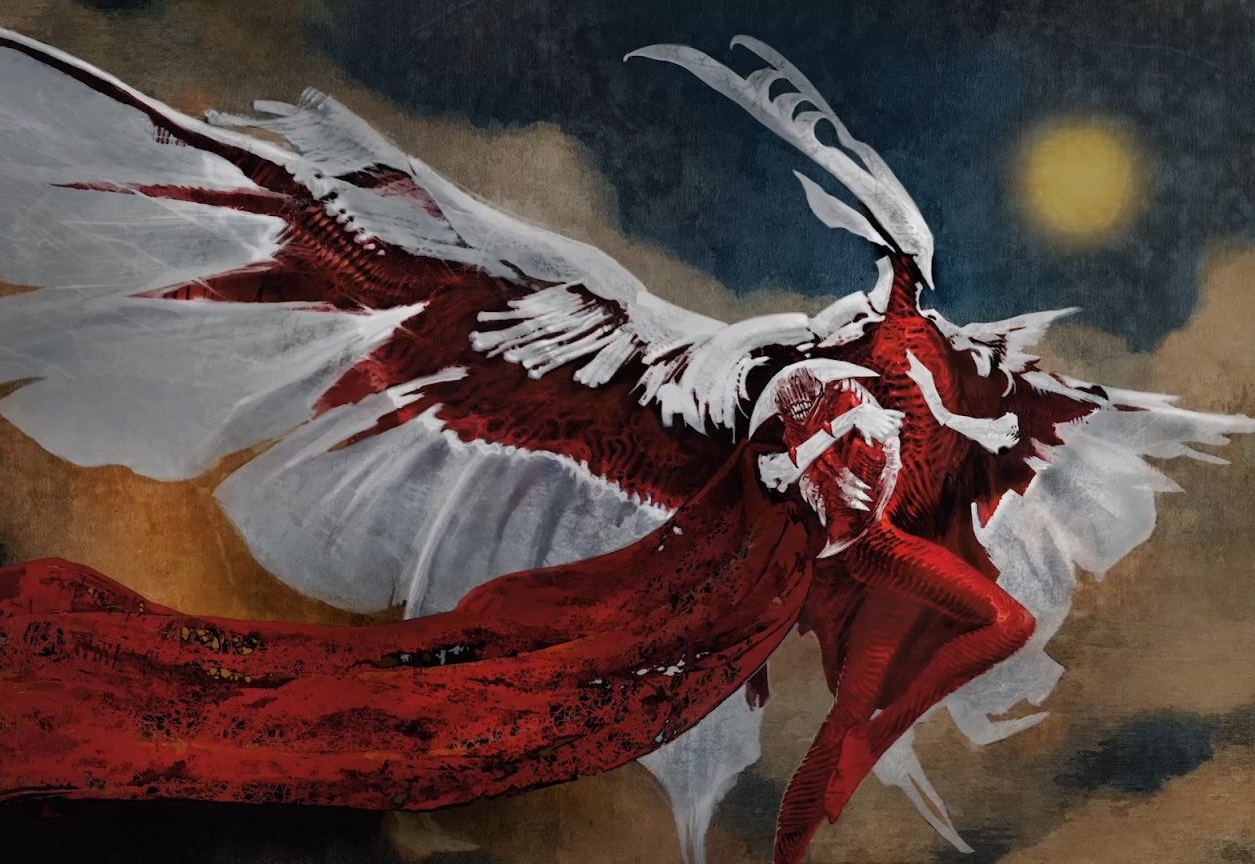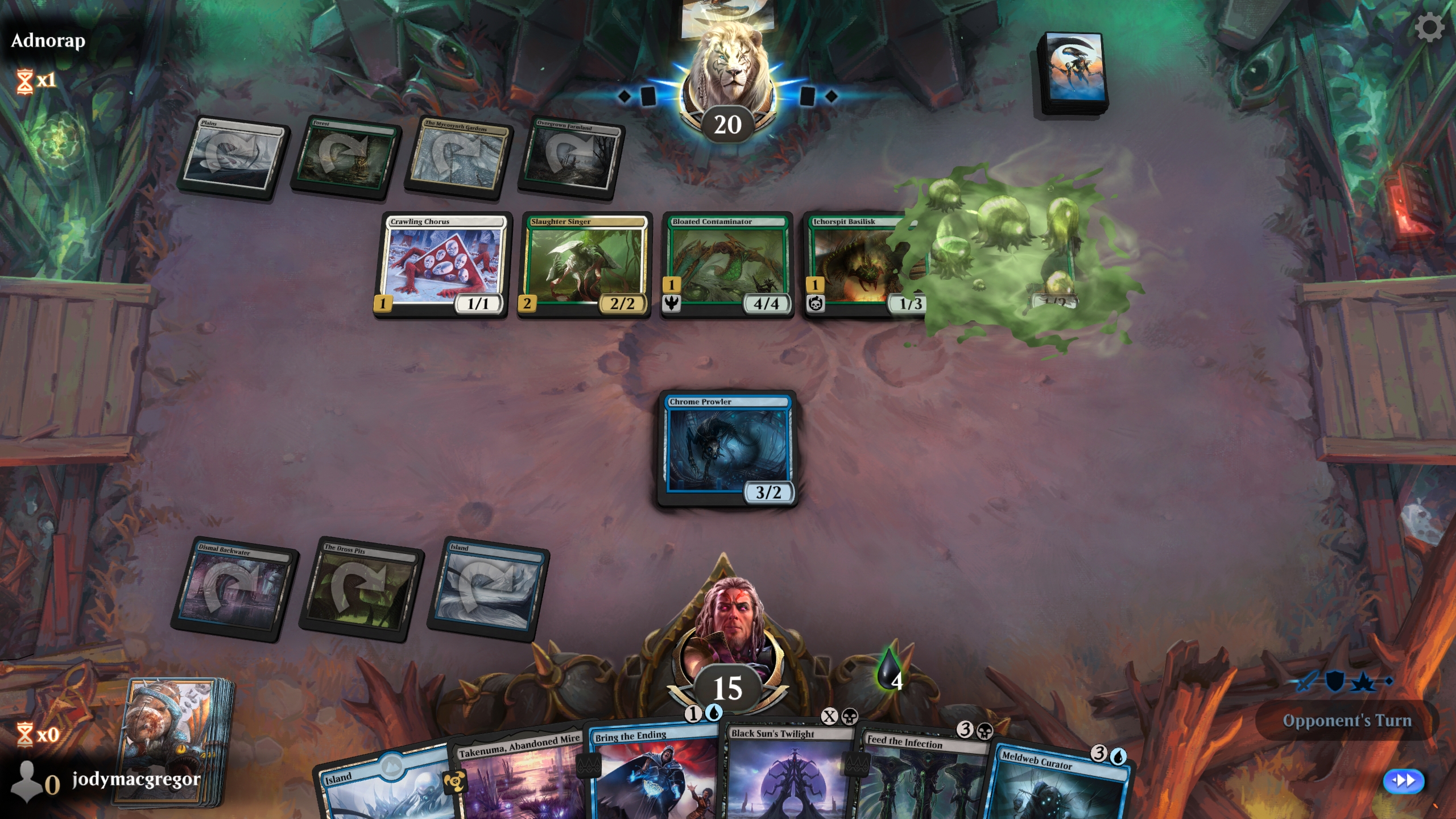Magic's new set has the only interesting poison mechanic I've seen in a game
Phyrexia: All Will Be One is about getting down with the sickness.

I've mentioned before that when I started playing Magic I leaned on a "white weenie" deck, the kind that's full of low-cost creatures who, if not dealt with, become an overwhelming horde by the midgame. Playing my first game with cards from Magic's new expansion Phyrexia: All Will Be One, I found myself back in familiar territory.
On turn two I played Skrelv's Hive, which pumps out a tiny 1/1 creature called a mite every turn at the cost of a life point. When you're riding high on 20 life, an easy price to pay. Over the next few turns I powered up those mites, giving my first little dude a sword called Infested Fleshcutter—how the tyke carries it I leave to the imagination—which gave it +2/+0 and summoned another mite when used to attack. Then I plonked down a Mite Overseer, which gave them all another +1, and Porcelain Zealot, which gives one creature +1/+1 for a turn, unless it has the "toxic" keyword, in which case it becomes +2/+2.
Mites, wouldn't you know it, all have the toxic keyword. My original mite could swing the Infested Fleshcutter for six points of damage by then, or at least would have if my opponent didn't shut that nonsense down with a roll of his eyes. But by then it was too late, and I had an army of the poisonous bugs I could ride to victory.
Different versions of Magic's poison mechanic showed up in a couple of older sets, but it's back with a central role in Phyrexia: All Will Be One. Every time a toxic creature damages a player, they get a number of poison counters—usually one, but up to three—and once you hit 10 it's game over, red rover. Doesn't matter how many life points you've got left, or that you only just brought out Sheoldred, the Apocalypse.
Normally I'm not a fan of poison. In games like Diablo 2, where it's a constant embuggerance throughout the second act, poison is just a test of your ability to budget a stock of potions. If you run out of antidotes before you run out of scorpions to kill, you're screwed and have to portal back to town. That's not an exciting challenge.
When you're given poisoned weapons to use as a player, it often feels pointless to slowly drain the health of enemies over time because you could achieve the same effect faster by simply hitting them some more. The chip damage poison added to the equation is usually miniscule, a real supervisor's contribution.

In the couple of days I've been playing Arena since the new set arrived in Magic's digital version, I've seen plenty of toxic cards in play, but it's almost always easier to win the old-fashioned way. I've only seen one game end in death by poisoning. That doesn't mean it's worthless, though. It changes how you prioritize threats, adding another layer of tension, and it plays into the new "corrupted" keyword.
Keep up to date with the most important stories and the best deals, as picked by the PC Gamer team.
Corrupted abilities kick in when an opponent has three or more poison counters. Skrelv's Hive, the thing that started churning out my mite army? Against a corrupted opponent, it gives your toxic creatures lifelink, meaning they heal you for every point of damage they cause. Other cards get cheaper to play once corruption kicks in, or have existing abilities enhanced.
It's a nice escalation that plays into the themes of Phyrexia: All Will Be One, a set that's about biomechanical S&M weirdos transforming the multiverse to suit their whims. Existing planeswalker cards return in twisted new forms, the angels look like they've been skinned and sandpapered smooth, and even the lands look alien and wrong. Once corruption effects begin it feels like everything's getting slightly worse, you're on a downhill slide to an inevitable doom, and you never know if the next play will hit harder because of it.

Another returning mechanic, proliferation, enhances that. Cards that proliferate let you choose to add an extra copy of a counter to anything that already has counters on it. That means more poison, but also more +1/+1 counters, more blood counters, more experience counters, more loyalty for planeswalkers, and more oil (newly added, oil counters can be spent by some Phyrexians to power their abilities).
There are less obvious uses too. One that didn't occur to me at all until someone pointed it out is saga cards. These cards have a different effect each turn as they tell chapters of their stories, and mark that progress with lore counters. By proliferating, you can have multiple chapters take effect in the same turn. Looking at the full list of counters on the Magic wiki makes my head kind of spin with the possibilities.
It's the kind of mechanic that'll have unexpected consequences, and it'll be fun to see how players take advantage of it. In paper Magic, the most immediate effect is that you'll need even more tokens to represent this stuff. A d10 is handy to keep track of poison if you're not using the MTG Companion app, especially if you've got one in a nice sickly green. In Arena, toxic cards splash down in a puddle of steamy, bubbling mucosal goo, while oil counters drip slickly into place. It's all very goopy.

What's made poison an interesting mechanic in Magic is that it has corruption and proliferation to interact with. It's not just a timer punishing you for leaving the antidote in your other trousers, it's an amplification of other threats, a tweaking of the overall volume and pace of a match.
I haven't even mentioned "For Mirrodin!", a keyword which gives you a free rebel token to represent the natives of New Phyrexia fighting back, or Phyrexian mana costs, which can be paid with two life points if you don't want to pay the regular colored mana. There's a lot going on basically.
We'll see how much all this shakes up the meta. Decks full of soldiers have been having an easy time of it since The Brothers' War, and it's high time for someone else to have a turn. Bring on the mite meta, I say.
Phyrexia: All Will Be One will be available in tabletop Magic: The Gathering from February 10, and is available in Magic: The Gathering Arena now. Digital boosters for this set count toward free golden packs, just like they did with The Brothers' War. Which is nice.

Jody's first computer was a Commodore 64, so he remembers having to use a code wheel to play Pool of Radiance. A former music journalist who interviewed everyone from Giorgio Moroder to Trent Reznor, Jody also co-hosted Australia's first radio show about videogames, Zed Games. He's written for Rock Paper Shotgun, The Big Issue, GamesRadar, Zam, Glixel, Five Out of Ten Magazine, and Playboy.com, whose cheques with the bunny logo made for fun conversations at the bank. Jody's first article for PC Gamer was about the audio of Alien Isolation, published in 2015, and since then he's written about why Silent Hill belongs on PC, why Recettear: An Item Shop's Tale is the best fantasy shopkeeper tycoon game, and how weird Lost Ark can get. Jody edited PC Gamer Indie from 2017 to 2018, and he eventually lived up to his promise to play every Warhammer videogame.

